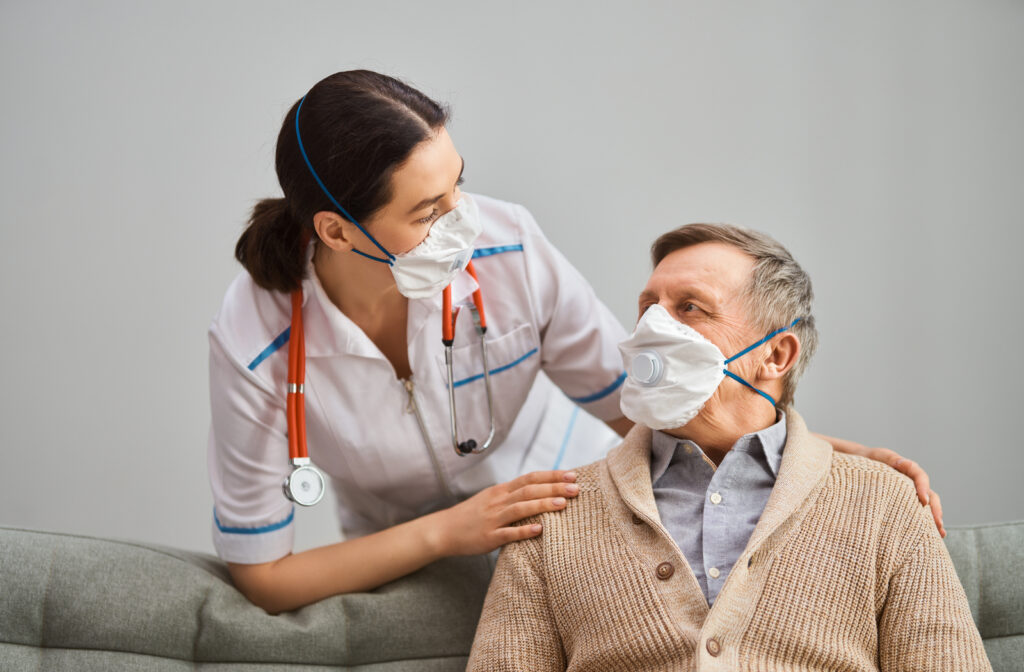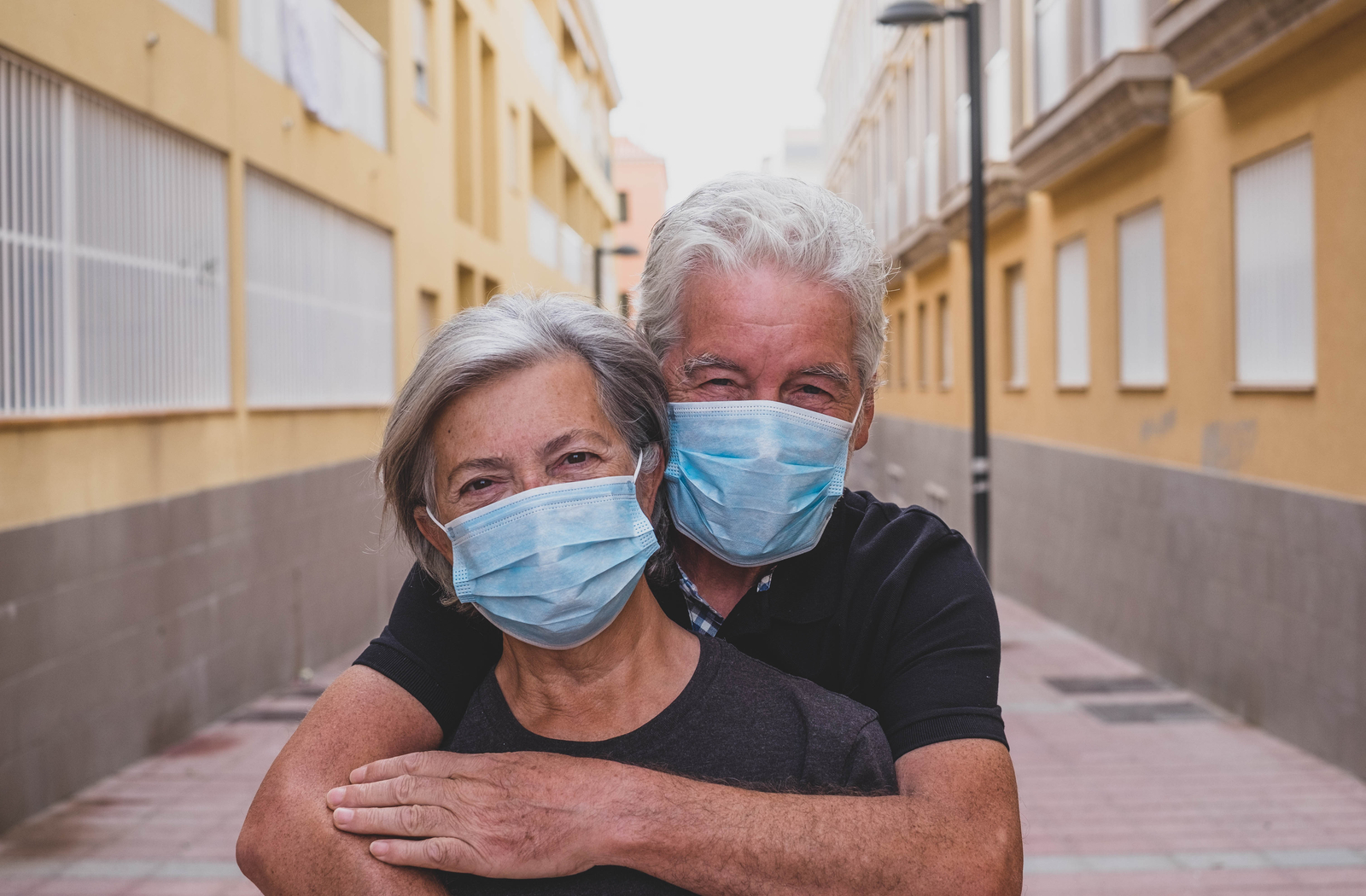In the past few months alone, there’s been lots of promising progress in making our way toward a new post-pandemic normal. At the same time, you may still have questions about how COVID-19 affects older adults and residents of assisted living facilities. Here are our answers to many of those frequently asked questions about seniors and COVID-19 in our community and around the country.
Is COVID-19 Different for Seniors?
There are some differences between symptoms of COVID-19 in older individuals when compared with their younger counterparts. Depending on underlying medical conditions, seniors might develop symptoms that aren’t seen in other cases of COVID-19, or they may take longer to show symptoms, including fever.
Fever is a common COVID-19 symptom, but it can manifest differently in adults 65 and older because their normal body temperatures may be lower than younger adults’ temperatures. For those older individuals, a temperature above 100°F, multiple readings above 99°F, or a rise of more than 2°F above their normal body temperature could be a sign of infection.
Is My Loved One At Risk of Depression During the Pandemic?
More than a year into this pandemic, we all understand that it can take a heavy toll. For seniors who felt isolated in long-term care even before the pandemic, it can feel especially hard.
There can undoubtedly be increased risks of negative mental health outcomes when long-term care facilities need to put lockdown measures in place to protect residents and halt any viral spread. However, those negative outcomes aren’t inevitable. In fact, a recent study found that rates of depression actually decreased during pandemic-related lockdowns, despite decreased visiting with family, when certain interventions were used.
Our highest priority is resident safety and, happily, widespread vaccination has made it safe to reduce or lift many of the restrictions that were previously in place to combat the spread of COVID-19.
In settings where face-to-face visits aren’t yet possible, or not as filled with hugs as they once were, you can connect with your loved one through phone and video calls, send cards and letters, and in many cases safely visit outdoors while wearing appropriate PPE or distancing.
Why are COVID-19 Outbreaks Seemingly Common in Long-Term Care Settings?
While outbreaks of COVID-19 happened in long-term care facilities (and other places where people live closely together) around the world in the early months of the pandemic, these spikes in cases are no longer nearly as common thanks to vaccination.
Since priority vaccination in long-term care settings began in late December, outbreaks, cases, and deaths have fallen sharply across the country. From late December to early February, COVID-19 deaths in nursing homes fell by more than 65%, even while they sadly rose elsewhere in the country. And new cases among nursing home residents fell by more than 80% in that same timeframe.

Is the COVID-19 Vaccine Safe for my Elderly Family Member?
All of the COVID-19 vaccines approved for use in the United States are proven to be safe and effective. More than 126 million Americans have already been vaccinated as of March 22, 2021. With the elevated risk of severe illness for older adults who contract COVID-19, a vaccine is the best way to protect yourself and others from illness, hospitalization, and death.
There’s no way to get COVID-19 from any COVID-19 vaccine. It’s good to know that it takes two to three weeks to develop some immunity after getting the shot, and individuals are not fully protected against illness during that time.
Some types of COVID-19 vaccine require more than one dose—also known as a booster—to reach their full protective potential, but there’s considerable protection beginning after a few weeks of that first dose.
Common Discomfort Following the COVID-19 Vaccine
As with all vaccines, some people will feel some common minor effects after receiving a dose of COVID-19 vaccine. Many of these are a positive sign that the body’s immune response is learning how to fight off the coronavirus. These symptoms include:
- Pain at the site of the injection
- Sore arm or shoulder
- Fever
- Tiredness
- Chills
- Headache
When Will My Loved One Be Vaccinated?
The federal government prioritized vaccinations for people living in nursing homes and other long-term care beginning in December 2020, and all of these residents are projected to have been able to be vaccinated by the end of March.
Older adults living outside of these facilities are now able to book vaccine appointments across the country, though the age cut-offs can vary between states and counties. As of March 24, in Massachusetts, people who are 60 and older, and people who meet other certain criteria, are able to book vaccine appointments.
I’m Fully Vaccinated. Can I Visit My Loved One in Long-Term Care?
People are considered fully vaccinated when two weeks have passed since their second dose or, for single-dose vaccines, their only dose of vaccine. The CDC notes that even fully vaccinated people should continue to take precautions such as wearing a mask, social distancing, and washing their hands.
The CDC also says that people who are fully vaccinated can spend time indoors with others who are fully vaccinated without masking. This may apply to a visit with a loved one in long-term care. Please contact us for our most up-to-date visiting guidelines.
How Can I Learn More About Current COVID Protocols?
Thanks to widespread vaccination, the future is looking bright for returning to visits and hugs with loved ones. For the most up-to-date information from us about visiting or any other questions, please phone us directly at 401-341-1968, or use our contact form, and we’re happy to help you make a plan to connect.





